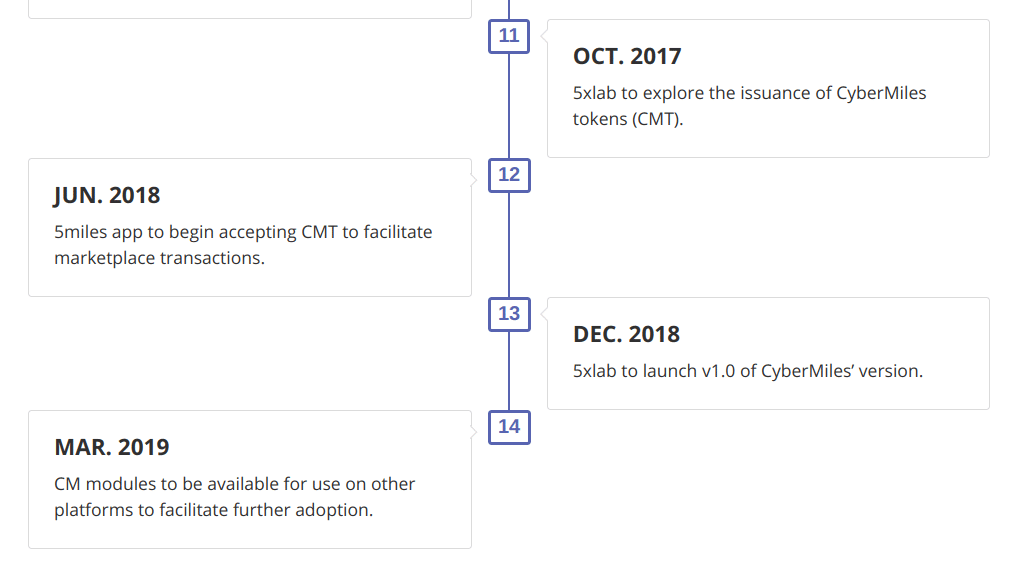
What is CyberMiles (CMT)?
CyberMiles is a new blockchain platform designed to facilitate fast ecommerce transactions. It’s a project from 5miles, a leading ecommerce company and app in the United States. With CyberMiles, 5miles hopes to create the protocols and a library of smart contracts for the future of ecommerce. It accomplishes these goals with high throughput delegated proof of stake consensus and a new virtual machine, similar to the Ethereum Virtual Machine.
Last November, CyberMiles raised $30 million in an ICO, distributing 420 million CMT. The roadmap for the project indicates that the 5miles ecommerce app, along with its 12 million users, will begin accepting CMT as payment beginning this summer. At the end of this year, CyberMiles hopes to launch the v1.0 of its blockchain.
Current Ecommerce Landscape
Why do we need a new ecommerce platform anyway? Aren’t platforms like Amazon and eBay doing well enough at delivering products to users?
Sure, Amazon is great at delivering reasonably priced goods to your doorstep. It’s easy to use and works well most of the time. The problem is that Amazon might be doing too well, at the expense of competition and innovation. Since there’s no one to challenge Amazon’s dominance in the ecommerce industry, it can be stagnant. It can afford to provide poor customer service or not innovate on its current technologies and product offerings. Additionally, it’s difficult for niche ecommerce brands to get a foothold and offer something unique.
This winner take all marketplace isn’t by mistake. Ecommerce brands become more valuable as their reach grows. They benefit from network effects and there’s a strong incentive for them to keep adding user at any cost and exclude competitors. This is especially true because the marketplace and shopper information is proprietary. Each ecommerce company manages its own settlement, transactions, and customer service.
However, it’s possible to imagine a world where this isn’t the case. What if the marketplace itself were decentralized. You could make settlements, transactions, dispute resolution, and returns all standard smart contracts that run on the blockchain. That would totally level the playing field for anyone who wants to buy or sell on that marketplace protocol.
This is CyberMiles’s vision. It wants to replace Amazon with a library of smart contracts that any ecommerce provider can use. Whether it will be successful is still a question for time to tell. There are some benefits to having a central authority, like faster processing times and centralized dispute resolution. Still, creating an open ecommerce platform is yet another example of where blockchain could remove a middleman institution.
5miles vs. CyberMiles Foundation
CyberMiles is banking a lot of its potential success on the fact that it will launch to 5miles’s user base. 5 miles is one of the top 10 most popular ecommerce apps in the United States. It has 12 million total users and does an estimated $3 billion in revenue annually.
If 5miles can get even a small portion of that $3 billion to transact in CMT, then it could be a huge boon for the token and the idea of blockchain ecommerce. Launching a platform at this scale comes with its own challenges and excitement. If the 5miles app successfully transitions to a blockchain-based backend, then it would be one of the largest enterprise applications of blockchain to date.
The CyberMiles Foundation is the body in charge of the CyberMiles project. It’s a Hong Kong-based not-for-profit organization. Its aim is to foster the development and adoption of the CyberMiles protocol, even outside 5miles.
CyberMiles aims to solve two key problems in the blockchain ecommerce space:
Problem: Transaction Volume
If you were going to build a blockchain ecommerce site as a dapp, it makes sense that you’d build it on Ethereum. Ethereum is the dominant player in the world of decentralized applications. However, for a large scale ecommerce application, Ethereum might not make the most sense.
One major challenge is transaction throughput. Ethereum’s network currently maxes out at 10 tx/sec. That could very well increase if/when the new Casper update releases. But up until now, large scale applications that reach any significant transaction numbers have slowed down Ethereum’s network. Even Cryptokitty trading slowed Ethereum’s network. Imagine what an ecommerce site with 15 million users would do to Ethereum without any new scaling solutions in place.
Solution: Proof of Stake Consensus
CyberMiles’s answer to this challenge is creating their own blockchain with a consensus mechanism that prioritizes high throughput. The goal is to allow for thousands of transactions per second as the protocol scales. Fast confirmation times would lead to quick sales and execution of contracts.
To do so, CyberMiles implements a delegated proof of stake consensus model. This means that individuals could put up a certain amount of CMT as collateral in exchange for the opportunity to confirm the transactions in a new block on the blockchain. Validators form a quorum that votes and converges on a consensus for the new block. Proof of stake is much more efficient and can have higher throughput than proof of work. Additionally, bad actors in proof of stake schemes get punished for making poor or malicious decisions.
In exchange for being an honest validator, proof of work rewards stakers with a certain percentage return on investment from the new block reward. In CyberMiles, this ROI is set at 8%, which is fairly high for proof of stake schemes. It’ll be interesting to watch the token economics play out once CyberMiles’s blockchain is live.
Problem: Contract Complexity
Another major problem for ecommerce on the blockchain is complexity. Writing a smart contract doesn’t have to be inordinately difficult. However, ecommerce marketplaces are inherently complex. Add to that complexity the challenges of developing on the blockchain where it’s more difficult to reverse mistakes.
The most popular ecommerce platforms today have extensive codebases that cover everything from user interface to product databases to securing payment information. Each of those functions, along with dozens of other functionalities in a good ecommerce solution, would need its own smart contract.
Solution: Contracts Library
CyberMiles’s solution is a library of smart contracts that handle every aspect of blockchain ecommerce. Many of these contracts are between users directly, but a large proportion are what CyberMiles calls “middleware.” It’s the stuff in the middle that allows all the pieces of the overall application to talk to one another. Standardizing and sharing modular smart contracts for every part of the ecommerce experience is a major part of CyberMiles’s mission. It’s a huge undertaking that will take tons of developer hours.

High Uptime
One major reason why you would want to use a blockchain for ecommerce is uptime. Blockchains run as a distributed ledger across a whole network of computers. Since there’s no central authority, there’s no easy way to shut a blockchain down. Even if a portion of the network loses connectivity, the blockchain will still persist.
This is a great quality to have in an online marketplace. It should be open and always available to customers, regardless of where you live or who you are. Moreover, an attacker shouldn’t be able to shut it down.
Community Governance & Arbitration
A challenge of putting ecommerce on the blockchain is governance and arbitration. CyberMiles claims that they’ll have easy ways to dispute transactions and reclaim lost funds. These rely on the community voting to give funds back, possibly in the form of a fork on the blockchain.
While this sounds like a decent solution, it’s likely to get tedious for the community members. Ecommerce platforms experience a high level of customer service complaints. In addition, they’re targets of fraud or poor quality products. This is one area where having a central authority is useful. They have executive power to reverse transactions and resolve claims. They can filter the types of products that enter the marketplace.
CyberMiles will need a compelling system for answering these fundamental challenges of ecommerce. With their experience from 5miles, one would hope that the team understands and can address the challenges of communal governance and arbitration.
Token Sale & Trading History
The CyberMiles ICO took place in November 2017. They raised $30 million to kick off the project. If you had invested in that ICO, you would have already made a 5x return on your investment 6 months later.
The token sale generated 70% of the total supply of CMT. It’s currently an ERC-20 token on the Ethereum network. The token will migrate to the proprietary network once that’s done by the end of the year.
CMT has seen huge swings in its trading history. It’s currently climbing back up near its January highs.
Team


Lucas Lu founded 5miles in 2014 and is the CEO for both 5miles and CyberMiles. He has a PhD in particle physics and he worked at CERN prior to getting involved in tech. He was an upper level manager at Alibaba and CTO of Light In The Box which went public on the NYSE.
Michael Yuan has a PhD in Astrophysics and is the project’s scientific lead. He’s the author of five books on software development and worked on Firefox, Fedora, JBoss and other open source projects.
The rest of the leadership team is also highly trained academically and experienced professionally.
How to Buy CyberMiles (CMT)
CyberMiles is currently available on the following exchanges:
Where to Store CyberMiles (CMT)
CyberMiles is currently and ERC-20 token, so you’ll be able to store it using any Ethereum Wallet. We recommend either MyEtherWallet or a Ledger Nano S.
Once the CyberMiles mainnet launches, you’ll need to trade in the ERC-20 token for the new proprietary token. That will come with its own wallet client.
Conclusion
If you believe in the idea of decentralized marketplaces for ecommerce, then CyberMiles is certainly an interesting project with a highly qualified team. That said, they are facing significant challenges in creating a high throughput network. They also need to figure out how to resolve disputes and issue back charges using decentralized governance. There aren’t easy answers here and CyberMiles is still a long way from releasing version one of their platform. Until then, tread lightly and proceed with cautious optimism.
Additional Resources
The post CyberMiles (CMT) & The Challenge of E-Commerce Smart Contracts appeared first on CoinCentral.

Coincentral.com is author of this content, TheBitcoinNews.com is is not responsible for the content of external sites.
Our Social Networks: Facebook Instagram Pinterest Reddit Telegram Twitter Youtube











